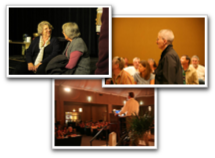Learn new skills and mindfulness techniques to improve your life and work with clients.
Earn CEs during 1-3 days of mindfulness training in Las Vegas, NV
with experts in the field of psychology and mental health.

Thousands of psychologists, social workers, nurses, and mental health professionals trust us to provide the best continuing education training and conference experiences.
Here are a few of the topics that will be covered in Las Vegas
In the serene Las Vegas foothills, with a view of beautiful Red Rock Canyon in a quiet & restorative resort setting.

Hotel & Conference Site: The Red Rock Resort & Casino
Call Reservations at 866-767-7773 for room reservations. There are a limited number of rooms, so we suggest you reserve before October 1, 2012. Ask for the FACES-Mindfulness Conference room rate of $149 + tax for single or double. (Included in your conference room rate is the resort fee ($25/day) and the fee to the incredible exercise facility ($30).
The Red Rock Resort & Casino
11011 W Charleston Blvd
Las Vegas, NV 89135
Join us for 1-3 days of mindfulness training, connect with friends, colleagues, and experts in the field.
Conference Agenda

The brain’s evolved bias is like Velcro for negative experiences, but Teflon for positive ones. The unfortunate results include stress and threat reactivity, anxiety, depression, and limited gains in psychotherapy. Happily, through three steps of mindful attention, we can internalize positive experiences in implicit memory systems, weaving resources for well-being, coping, and kindness into the fabric of the brain and the self.
Author, Buddha’s Brain, Neuropsychologist, Founder, Wellspring Institute of Neuroscience

Implicit memory systems – including expectations, emotional residues and reactive patterns – are a primary target of therapy. Since they are vulnerable to change during consolidation, the skillful pairing of positive and negative material in awareness can gradually soothe and ultimately replace negative implicit memories. This workshop will explore neuro-savvy methods for doing this, including how to identify the positive material that will best “antidote” old pain or deficits in internalized resources.
Author, Buddha’s Brain, Neuropsychologist, Founder, Wellspring Institute of Neuroscience

Mindfulness-based psychotherapy is the most popular new treatment approach in the last decade—and for good reason. Mindfulness practices hold great promise not only for our own personal development, but also as remarkably powerful tools to augment virtually every form of psychotherapy. Mindfulness is not, however, a one-size-fits-all remedy. Practices need to be tailored to fit the needs of particular individuals—and this workshop will show you how. Once you understand the components of mindfulness practices and how they work to alleviate psychological distress, you’ll be able to creatively adapt them to meet the needs of diverse people and conditions. You’ll learn how to use mindfulness practices to help resolve anxiety, depression, stress-related medical disorders, and even interpersonal conflict, gaining practical knowledge and skills that will take your practice of mindfulness-based psychotherapy to the next level.
Ronald Siegel, Psy.D. is an Assistant Clinical Professor of Psychology at Harvard Medical School. He is the Co-Editor of Mindfulness and Psychotherapy and the Author of The Mindfulness Solution: Everyday Practices for Everyday Problems.
Why is it difficult for we, and our clients, to establish a regular sitting practice? Why does it often feel like a “should” rather than a nourishing activity which we look forward to? In this workshop we will explore ways to become more wholeheartedly engaged in meditation practice.
Learning Objectives:
- Understand the psychological reasons clients avoid meditation.
- Learn techniques to teach clients for enlivening meditation at the beginning of a session.
- Learn techniques for arousing affect in meditation.
Founding board member, The Institute for Meditation and Psychotherapy, Boston, MA; Co-author, Mindfulness & Psychotherapy

Ronald Siegel, Psy.D. is an Assistant Clinical Professor of Psychology at Harvard Medical School. He is the Co-Editor of Mindfulness and Psychotherapy and the Author of The Mindfulness Solution: Everyday Practices for Everyday Problems.
Generic meditation instructions are limited in their efficacy. Without finding ways to make meditation personally engaging and meaningful it will not take root in our lives, or in the lives of clients we work with. In this workshop we will explore ways to personally enliven the practice, so that we and our clients look forward to the practice.
Learning Objectives:
- Understand the psychological reasons clients avoid meditation.
- Learn & experience techniques to teach clients for enlivening meditation at the beginning of a session.
- Learn techniques for arousing affect in meditation.
Founding board member, The Institute for Meditation and Psychotherapy, Boston, MA; Co-author, Mindfulness & Psychotherapy

Roshi Joan Halifax will explore “edge states”, or the challenges faced by clinicians, therapists and caregivers. She will touch on basic research in social psychology on mindfulness and compassion, and cover six contemplative interventions that are useful for clinicans and caregivers. She introduces program participants to three meditation practices that form a base for cultivating compassion & share a model of compassion that is systems based.
Roshi Joan is a Buddhist teacher, anthropologist, author & social activist, Abbott & Head Teacher, Upaya Zen Center, Santa Fe, N.M., Author of many books, including Empathy, Altruism & Compassion: Practices & Perspectives

Roshi Joan is a Buddhist teacher, anthropologist, author & social activist, Abbott & Head Teacher, Upaya Zen Center, Santa Fe, N.M., Author of many books, including Empathy, Altruism & Compassion: Practices & Perspectives

There are great benefits to bringing together the spirit and intelligence of contemplative trainings in mindfulness, presence and compassion with the many skillful approaches of Western psychology. We will learn how these complementary psychologies can be artfully combined to foster healing of the body and mind, tend the heart, deepen therapeutic work and enhance long term positive transformation.
Founder/Director, Spirit Rock Meditation Center in Woodacre, CA: Author of number books, including The Wise Heart

The focus of traditional western psychology and medicine has been on pathology, its diagnosis and it’s healing. Modern neuroscience and the trainings of eastern psychology have come together to demonstrate that beyond healing illness there is a profound human capacity for well being and freedom. Using practices, examples and teachings we will explore this very real territory of growing in well being, for ourselves and those we treat.
Founder/Director, Spirit Rock Meditation Center in Woodacre, CA: Author of number books, including The Wise Heart

Mindfulness skills are the core skills in DBT, an empirically supported treatment for individuals with severe and complex mental disorders. This talk outlines the specific mindfulness skills used in DBT.
The roots of mindfulness practice are in the contemplative practices common to both Eastern and Western spiritual disciplines. This talk describes the application of these mindfulness skills in treating severe and complex disorders.
Professor of Psychology, Director of the Behavioral Research & Therapy Clinics, University of Washington;
Author, Cognitive-Behavioral Treatment for Borderline Personality Disorders






